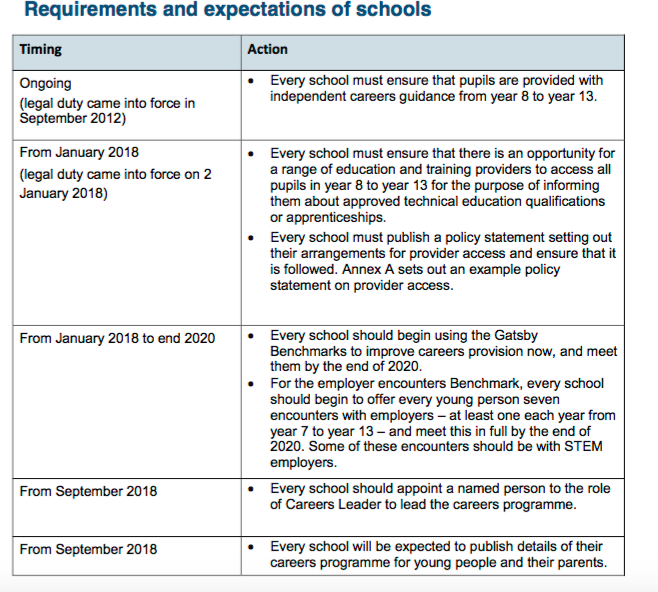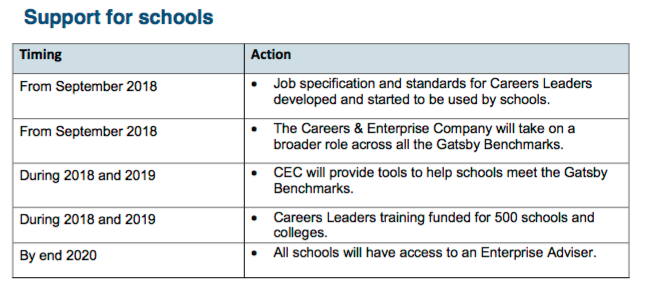Last week (5th January) the Department for Education published new statutory guidance for governing bodies, school leaders and school staff. The guidance covers Careers guidance and access for education and training providers, it replaces the version issued in March 2015 (and re-issued in April 2017 with a minor update).
This guidance has been updated and expanded to meet the aims of the Careers Strategy (Launched at the end of last year) to make sure that all young people in secondary school get a programme of advice and guidance that is stable, structured and delivered by individuals with the right skills and experience. The guidance has been updated around the Gatsby benchmarks.
Main points
- The Benchmarks go further by defining all of the elements of an excellent careers programme, based on the best national and international research. Government recognises that the work needed to meet all eight Benchmarks will vary for individual schools. Government’s expectation is that schools begin to work towards the Benchmarks now and meet them by the end of 2020. Compass is an online self-evaluation tool6 for schools to use to assess how their careers support compares against the Gatsby Benchmarks and the national average. Schools should baseline themselves using this tool, consider the opportunities to improve their careers programme based on their confidential results, and track their progress against the Benchmarks over time.
- The careers strategy explains that both co-ordinated external support and an appropriately skilled and experienced leader in school are important to help schools meet the Benchmarks. This statutory guidance explains what support will be made available to schools between now and 2020.
- The Careers & Enterprise Company (CEC) will provide external support to schools. In 2014, the Government established the CEC, to provide the strategic coordination for employers, schools, colleges, funders and careers programme providers to create high impact careers and enterprise support to young people (aged 12-18). The CEC’s initial focus has been on employer engagement, based on evidence about the importance of giving young people more opportunities to connect with employers of all sizes, and from all sectors. These encounters will inspire pupils and allow them to learn about what work is like, or what it takes to be successful in the workforce. The careers strategy confirmed that the CEC will take on a more ambitious role, building on their progress to date by coordinating support for schools across all of the Gatsby Benchmarks.
- The careers strategy sets out that that every school needs a Careers Leader who has the energy and commitment, and backing from their senior leadership team, to deliver the careers programme across all eight Gatsby Benchmarks. Every school will be asked to name this Careers Leader. This requirement will be introduced in September 2018, by when more information and support will be made available.
- The way in which careers guidance will continue to be considered during Ofsted inspection is set out in Ofsted’s Common Inspection Framework and School Inspection Handbook. A successful careers guidance programme will also be reflected in higher numbers of pupils progressing to positive destinations such as apprenticeships, technical routes, sixth form colleges, further education colleges, universities or employment. Destination measures provide clear and comparable information on the success of schools in helping all of their pupils take qualifications that offer them the best opportunity to continue in education or training. We publish KS4 and 16-18 (KS5) education destinations in performance tables on gov.uk9, meaning that they are becoming an established part of the accountability system.
The requirements and expectations of schools:

 Next Steps:
Next Steps:
You can read the careers strategy here
Find out more about our free careers resources here
Download the full report here














